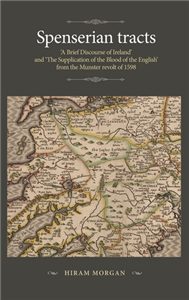Spenserian tracts
'A Brief Discourse of Ireland' and 'The Supplication of the Blood of the English' from the Munster revolt of 1598
by Hiram Morgan
Description
More Information
Rights Information
Albania, Algeria, Angola, Argentina, Armenia, Australia, Austria, Bahrain, Belgium, Belize, Benin, Bolivia, Bosnia and Herzegovina, Botswana, Brazil, Bulgaria, Burkina Faso, Burundi, Cameroon, Canada, Cape Verde, Central African Republic, Chad, Chile, China, Colombia, Comoros, Congo [DRC], Congo, Republic of the, Costa Rica, Ivory Coast, Croatia, Czech Republic, Denmark, Djibouti, Ecuador, Egypt, El Salvador, Equatorial Guinea, Eritrea, Estonia, Ethiopia, Faroe Islands, Finland, France, French Guiana, Gabon, Gambia, Georgia, Germany, Ghana, Greece, Guatemala, Guinea, Guinea-Bissau, Guyana, Honduras, Hongkong, Hungary, Iceland, India, Indonesia, Iran, Iraq, Ireland, Israel, Italy, Japan, Jordan, Kazakhstan, Kenya, Kuwait, Latvia, Lebanon, Lesotho, Liberia, Libya, Lithuania, Luxembourg, Macau, China, Macedonia [FYROM], Madagascar, Malawi, Malaysia, Mali, Malta, Mauritania, Mauritius, Mayotte, Mexico, Mongolia, Montenegro, Morocco, Mozambique, Namibia, Netherlands, New Zealand, Nicaragua, Niger, Nigeria, Norway, Oman, Pakistan, Panama, Paraguay, Peru, Philippines, Poland, Portugal, Puerto Rico, Qatar, Reunion, Romania, Russia, Rwanda, Saint Helena, Sao Tome and Principe, Saudi Arabia, Senegal, Serbia, Seychelles, Sierra Leone, Singapore, Slovakia, Slovenia, Somalia, South Africa, South Korea, Spain, Sri Lanka, Sudan, Suriname, Swaziland, Sweden, Switzerland, Syria, Taiwan, Tanzania, Thailand, Timor-Leste, Togo, Tokelau, Tunisia, Turkey, Uganda, Ukraine, United Arab Emirates, United Kingdom, United States, Uruguay, Venezuela, Vietnam, Western Sahara, Yemen, Zambia, Zimbabwe, South Sudan, Cyprus, Palestine, Bangladesh, Cambodia, Liechtenstein, Azerbaijan, Jamaica, Kyrgyzstan
Endorsements
This book explores the English response to the sudden and devastating 1598 revolt against the Munster colony through two anonymous texts that have been associated with the poet and planter Edmund Spenser. Set against the background of nationwide unrest in Ireland and the ongoing Anglo-Spanish conflict, both the Brief Discourse and longer Supplication display huge vitriol against the untrustworthy Irish and their Catholic conspiracies and demand rapid action by the state in London to save the beleaguered colonists and England's control of Ireland as a whole. The more extreme, propagandistic and providentialist Supplication wanted revenge and was openly contemptuous of Queen Elizabeth for not doing her duty as a godly prince to defend those striving with their own blood and treasure to make Ireland a more civilized place. As well as contextualizing the documents and exploring the mentalities, themes and literary influences involved, this study also explores the problems of their authorship looking at a variety of English colonists, clergy and officials in Ireland in addition to Spenser himself. Eventually the laborious process of stylometric testing was used to compare the two anonymous texts against 21 other contemporary writings. The tests established Spenser as author of the Brief Discourse, which was already odds on, but discovered an entirely unexpected author for The Supplication who was not known to have been in Munster in 1598. These important texts have been fully annotated and are presented to the public in modernized English.
Reviews
This book explores the English response to the sudden and devastating 1598 revolt against the Munster colony through two anonymous texts that have been associated with the poet and planter Edmund Spenser. Set against the background of nationwide unrest in Ireland and the ongoing Anglo-Spanish conflict, both the Brief Discourse and longer Supplication display huge vitriol against the untrustworthy Irish and their Catholic conspiracies and demand rapid action by the state in London to save the beleaguered colonists and England's control of Ireland as a whole. The more extreme, propagandistic and providentialist Supplication wanted revenge and was openly contemptuous of Queen Elizabeth for not doing her duty as a godly prince to defend those striving with their own blood and treasure to make Ireland a more civilized place. As well as contextualizing the documents and exploring the mentalities, themes and literary influences involved, this study also explores the problems of their authorship looking at a variety of English colonists, clergy and officials in Ireland in addition to Spenser himself. Eventually the laborious process of stylometric testing was used to compare the two anonymous texts against 21 other contemporary writings. The tests established Spenser as author of the Brief Discourse, which was already odds on, but discovered an entirely unexpected author for The Supplication who was not known to have been in Munster in 1598. These important texts have been fully annotated and are presented to the public in modernized English.
Author Biography
Hiram Morgan is Senior Lecturer in History at University College Cork
Manchester University Press
Manchester University Press is a leading UK publisher known for excellent research in the humanities and social sciences.
View all titlesBibliographic Information
- Publisher Manchester University Press
- Publication Date July 2024
- Orginal LanguageEnglish
- ISBN/Identifier 9781526156433 / 1526156431
- Publication Country or regionUnited Kingdom
- FormatPrint PDF
- Pages272
- ReadershipGeneral/trade
- Publish StatusPublished
- Dimensions234 X 156 mm
- Biblio NotesDerived from Proprietary 5403
- SeriesThe Manchester Spenser
- Reference Code13879
Manchester University Press has chosen to review this offer before it proceeds.
You will receive an email update that will bring you back to complete the process.
You can also check the status in the My Offers area

Please wait while the payment is being prepared.
Do not close this window.



